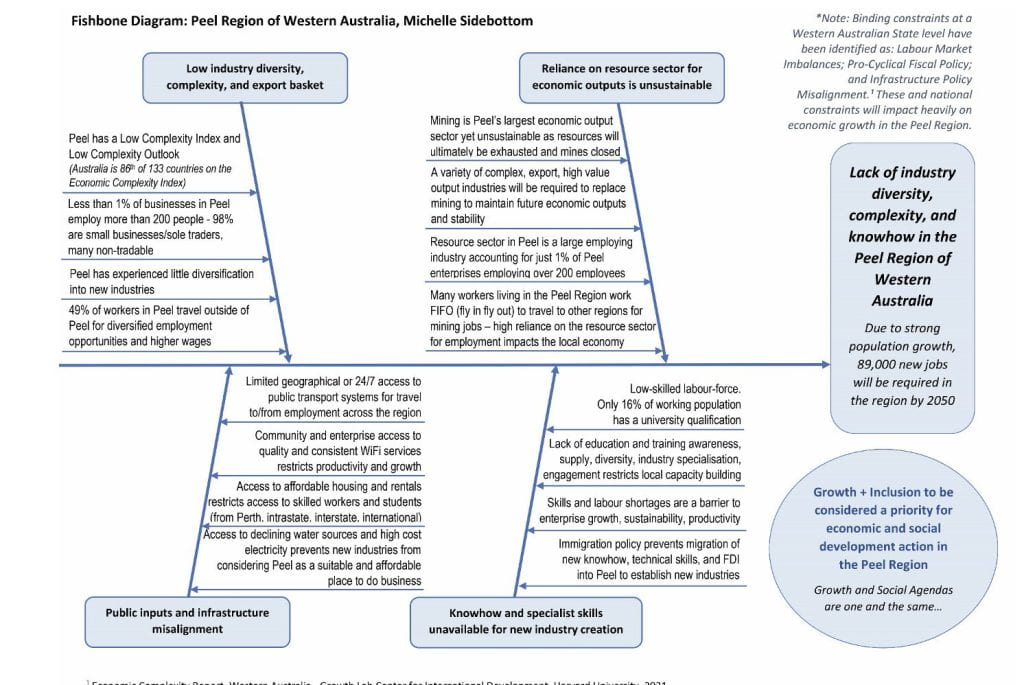Guest Blog by Michelle Sidebottom, LEG ’22
What an exceptional learning experience! Thank you. My key ideas/learnings from LEG2022 included:
- Examining the ‘Product Space’ enabled a clearer picture for identifying realistic pathways for jumping short distances to ‘near-by trees’ to create opportunities for industry diversification, innovation and increasing complexity in the Peel Region of Western Australia.
- How to tackle growth diagnostics, identifying binding constraints, and deconstructing problems within a local context to reveal root causes and possible next steps towards opportunities and actions for positive change.
- The Problem Driven Iterative Adaptation (PDIA) approach presented a simple, yet highly organised and practical method for learning, actioning, and accelerating economic growth that can be undertaken by teams within any national, regional or city context.
- The concept of ‘Growth+Inclusion’ highlighted the importance of equity and inclusion for all members of our community, and how growth and social agendas are one and the same.
- The benefits of becoming high bandwidth organisations and the creation of effective pathways to economic growth through multi-agent leadership.
- I particularly enjoyed the diversity and comradery of my Peer Learning Group (team name ‘Global Brew’) throughout the program. We represented very different countries and cultures however despite this, we realised we all have a common goal to help our respective nations, regions and cities, and the people within them, to achieve a better life through economic growth and social inclusion.
Our group showed compassion, kindness and support for one another over our 10 weeks together and through this we have not only established new international networks, we have become friends. I will miss our weekly Global Brew talks, WhatsApp Group exchanges, and our fun little chats about our lives outside of the program.
The LEG course equipped me with a better understanding of the importance of economic development to our society and what actions and leadership is possible to achieve growth and inclusion.
The insightful information communicated through the faculty, guest speakers, staff, peer learning group, tools, and resources made it possible for me to apply this newfound knowledge directly to the context in which I am working i.e. the Peel Region of Western Australia.
Using my new skills, I was able to identify a Growth Challenge for the Peel Region of Western Australia [Lack of industry diversity, complexity, and knowhow in a region of strong population growth – an additional 89,000 jobs will be required by 2050]. From there I was able to conduct a growth diagnostic; deconstruct individual barriers using the ‘Fishbone Diagram’ method; identify opportunities for further research, learning, advocacy, and action; and progress to the development of a growth strategy concept for implementation by high bandwidth teams through a ‘Problem Driven Iterative Adaptation’ (PDIA) approach.
The program has educated and motivated me to design a new ‘pilot program’ model under this framework and PDIA approach of which I have shared and has been well-received by my colleagues at the Peel Development Commission.
The practical skills and confidence I have acquired is swinging straight into action. I have already created a draft growth strategy to tackle the need for more industry diversity, complexity, and knowhow in the Peel region of Western Australia entitled the ‘Peel Development Commission Industry Accelerator Pilot Program’.
I will now fine-tune this pilot program (and other socio-economic development Action concepts I have drafted, including useful tools such as the PDIA Tool Kit and City Leader Guides), for sharing with the Peel Development Commission Board, Executive Team, and other organisations I am involved in across the public and private sectors, and advocate for, and lead, positive action.
I am also, more than ever committed to Growth + Inclusion for our Aboriginal people, women, youth, and other marginalised members of our community.
To say I am highly motivated to take advantage of my newfound knowledge and awareness is quite the understatement…
I enjoyed learning about the benefits of multi-agent leadership and highly functional teams to achieve economic growth, so would like to explore better ways to improve my own leadership skills and qualities to maximise continuous learning, better decision making, mobilising teams, and motivating people to achieve collective success.
Our LEG2022 Group #2, Global Brew team, was nased in Ethiopia, USA, Honduras, Australia, and Pakistan. We are a melting pot of global perspectives and visions for positive action and change.
International networks and lifelong friends!
My Fishbone Diagram: Challenge for the Peel Region of Western Australia:

This is a blog series written by the alumni of the Leading Economic Growth Executive Education Program at the Harvard Kennedy School. 71 Participants successfully completed this 10-week online course in May 2022. These are their learning journey stories.
